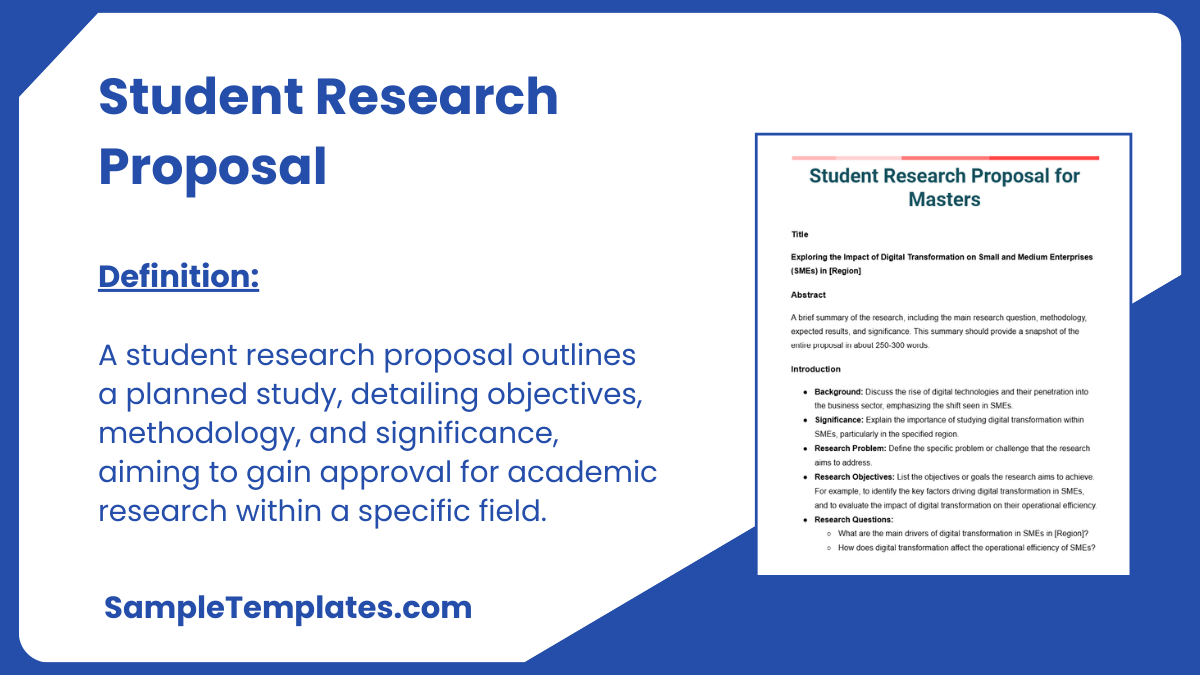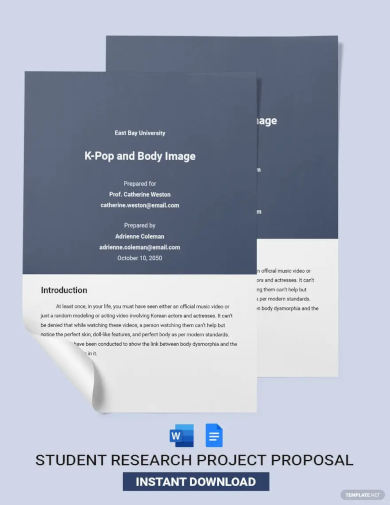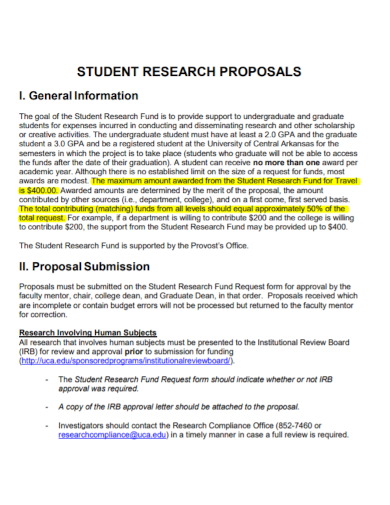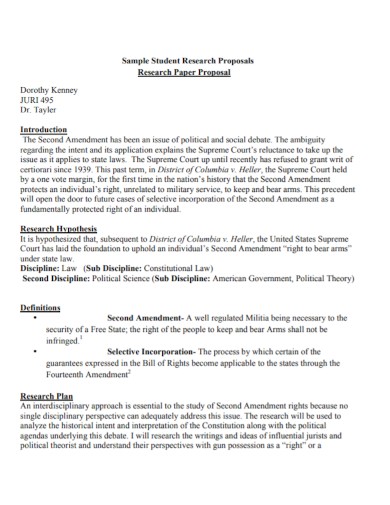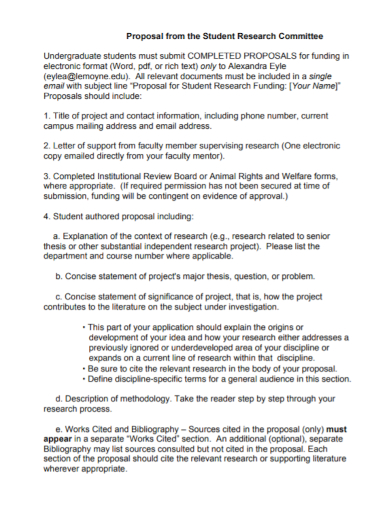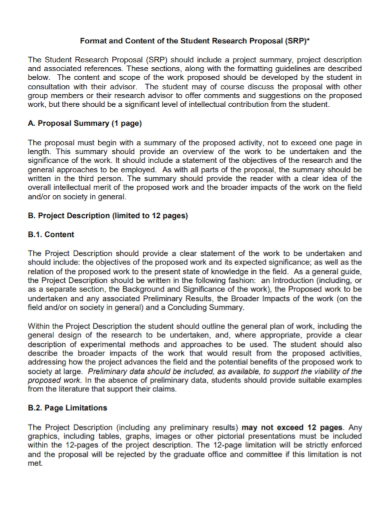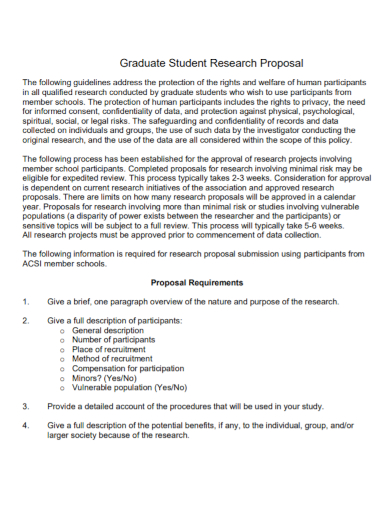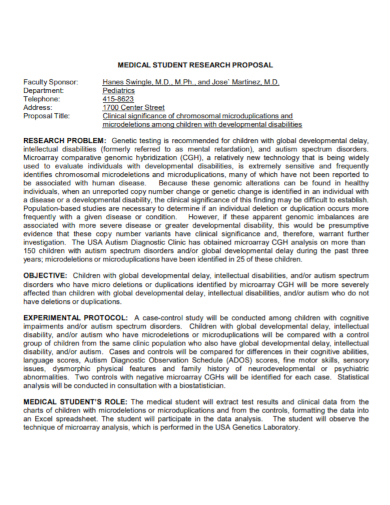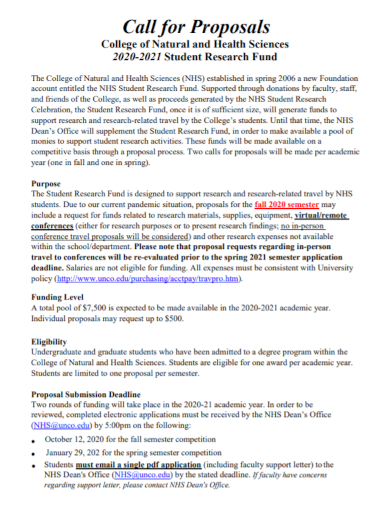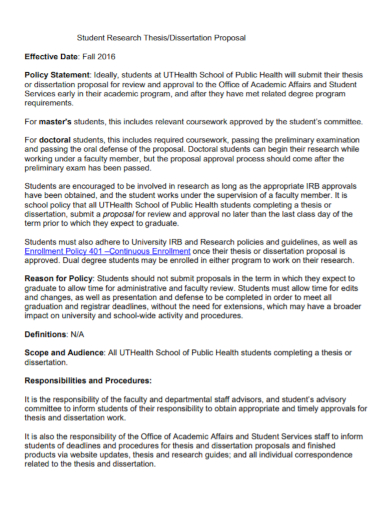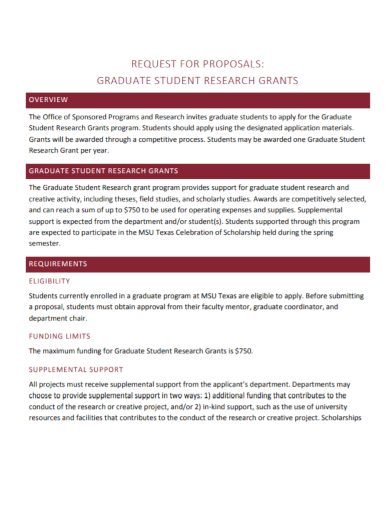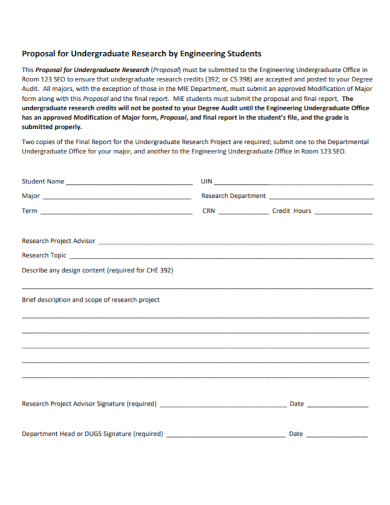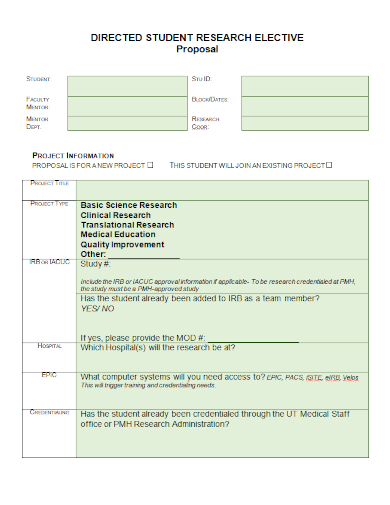Before we are going to begin with the details about a student research proposal, let us try to define first what a research proposal is. By definition, a research proposal is something that provides a concise summary of your proposed research in which it has the ability to set out specific issues that is intended to be addressed. They provide an outline of the study in which you research covers which may refer to any recent issues or debates. It must be able to demonstrate the originality of your proposed research. A sample proposal can be one of the most essential document that you have to submit. It provides a great opportunity to let you demonstrate that you have that level of aptitude in the graduate research through portraying your ability to communicate ideas in a clear and concise manner. It will also help you to match your research interest into the appropriate supervisor. In this article, you will be able to know more information about a student research proposal.
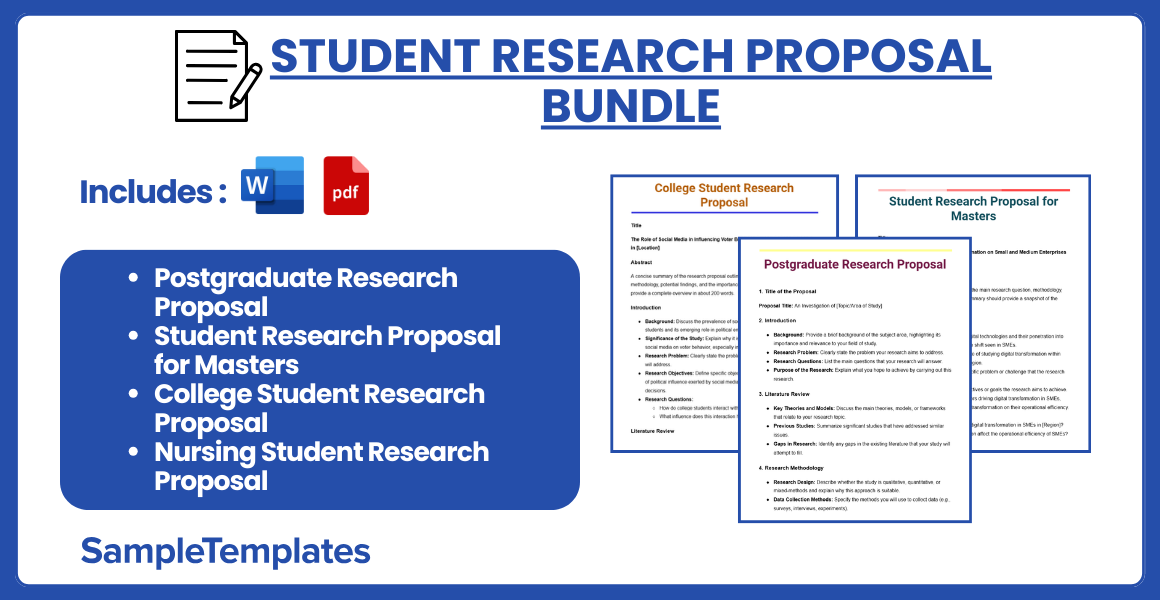
Download Student Research Proposal Bundle
Postgraduate Research Proposal
1. Title of the Proposal
Proposal Title: An Investigation of [Topic/Area of Study]
2. Introduction
- Background: Provide a brief background of the subject area, highlighting its importance and relevance to your field of study.
- Research Problem: Clearly state the problem your research aims to address.
- Research Questions: List the main questions that your research will answer.
- Purpose of the Research: Explain what you hope to achieve by carrying out this research.
3. Literature Review
- Key Theories and Models: Discuss the main theories, models, or frameworks that relate to your research topic.
- Previous Studies: Summarize significant studies that have addressed similar issues.
- Gaps in Research: Identify any gaps in the existing literature that your study will attempt to fill.
4. Research Methodology
- Research Design: Describe whether the study is qualitative, quantitative, or mixed-methods and explain why this approach is suitable.
- Data Collection Methods: Specify the methods you will use to collect data (e.g., surveys, interviews, experiments).
- Sampling: Detail your sampling method and the size and characteristics of the sample.
- Data Analysis: Outline the techniques you will use to analyze the data.
5. Ethical Considerations
- Ethical Approval: Mention any ethical approvals needed or received.
- Participant Consent: Describe how you will ensure informed consent from participants.
- Data Protection: Explain how you will protect the data and maintain confidentiality.
6. Expected Outcomes
- Research Contribution: Discuss the potential contributions of your research to the field.
- Practical Implications: Explain how your findings might be applied in practical settings.
7. Timeline
- Schedule: Provide a detailed timeline for the completion of each phase of your research.
8. Budget
- Funding Requirements: Itemize the budget required for various elements of the research such as materials, travel, and any stipends.
9. References
- Bibliography: List all the academic sources referenced in your proposal in an appropriate academic style.
10. Appendices
- Additional Documents: Include any supporting materials that are relevant to the research proposal, such as questionnaires or detailed tables.
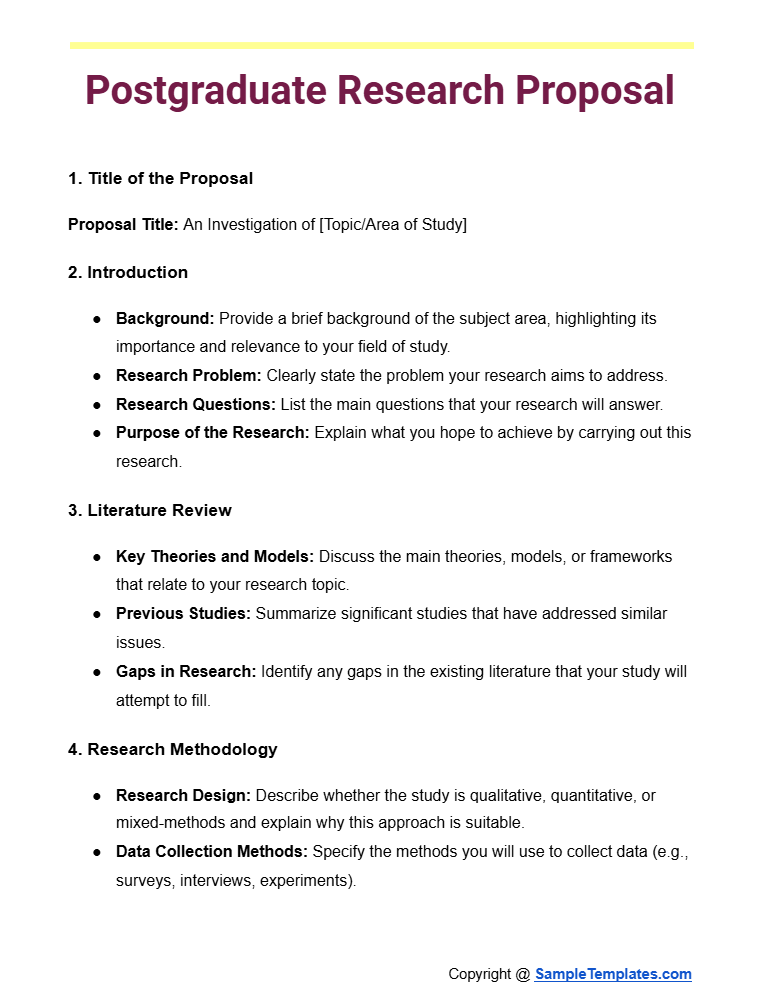
Student Research Proposal for Masters
Title
Exploring the Impact of Digital Transformation on Small and Medium Enterprises (SMEs) in [Region]
Abstract
A brief summary of the research, including the main research question, methodology, expected results, and significance. This summary should provide a snapshot of the entire proposal in about 250-300 words.
Introduction
- Background: Discuss the rise of digital technologies and their penetration into the business sector, emphasizing the shift seen in SMEs.
- Significance: Explain the importance of studying digital transformation within SMEs, particularly in the specified region.
- Research Problem: Define the specific problem or challenge that the research aims to address.
- Research Objectives: List the objectives or goals the research aims to achieve. For example, to identify the key factors driving digital transformation in SMEs, and to evaluate the impact of digital transformation on their operational efficiency.
- Research Questions:
- What are the main drivers of digital transformation in SMEs in [Region]?
- How does digital transformation affect the operational efficiency of SMEs?
Literature Review
- Theoretical Framework: Introduce and discuss the theories and models that underpin digital transformation in businesses.
- Review of Related Literature: Analyze previous studies on digital transformation, highlighting findings relevant to SMEs, and noting gaps that your research will address.
Methodology
- Research Design: Describe the research approach (qualitative, quantitative, or mixed-methods) and justify the choice.
- Data Collection: Specify the methods for data collection (e.g., surveys, interviews, case studies).
- Sample: Detail the sampling process, including how participants will be selected, the size of the sample, and the rationale for these choices.
- Data Analysis: Describe how the data will be analyzed. For quantitative studies, specify the statistical tools and techniques. For qualitative studies, outline the coding and thematic analysis process.
Ethical Considerations
- Ethics Approval: Outline the process for obtaining ethics approval from your institution.
- Consent: Describe how consent will be obtained from participants.
- Confidentiality: Explain measures to ensure confidentiality and data protection.
Expected Results
- Preliminary Findings: Discuss what you expect to find based on your literature review and research objectives.
- Impact of the Research: Explain how your research can contribute to academic knowledge and practical applications in the field of digital transformation.
Timeline
Provide a month-by-month timeline for completing the research, from the initial literature review and data collection to the final presentation of your thesis.
Budget
Outline a budget that covers all necessary expenses, including travel for field research, software for data analysis, and any other resources.
References
List all sources cited in your proposal in an appropriate academic format.
Appendices
Include any supplementary material that supports your proposal, such as questionnaires, interview guides, or additional data.
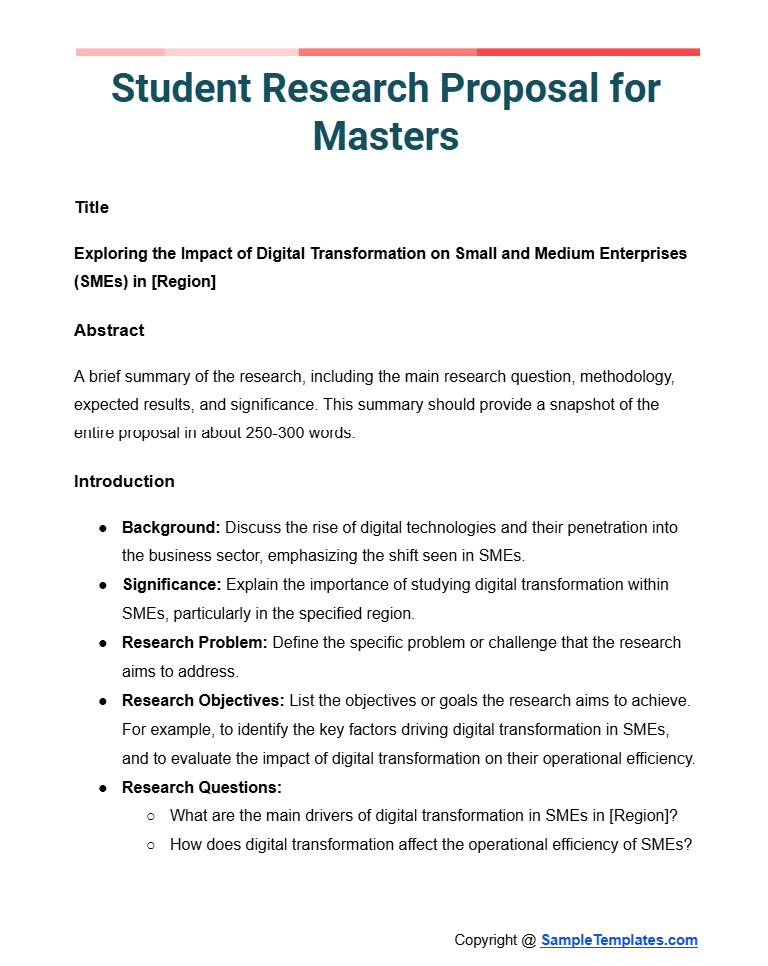
College Student Research Proposal
Title
The Role of Social Media in Influencing Voter Behavior Among College Students in [Location]
Abstract
A concise summary of the research proposal outlining the main research questions, methodology, potential findings, and the importance of the study. The abstract should provide a complete overview in about 200 words.
Introduction
- Background: Discuss the prevalence of social media use among college students and its emerging role in political engagement.
- Significance of the Study: Explain why it is crucial to understand the impact of social media on voter behavior, especially in a college setting.
- Research Problem: Clearly state the problem or phenomenon that the research will address.
- Research Objectives: Define specific objectives, such as measuring the extent of political influence exerted by social media on college students’ voting decisions.
- Research Questions:
- How do college students interact with political content on social media?
- What influence does this interaction have on their voting behavior?
Literature Review
- Theoretical Framework: Outline theories related to media influence and political behavior to provide a foundation for the study.
- Review of Existing Literature: Summarize key findings from previous research on social media and voter behavior, highlighting gaps that your study will address.
Methodology
- Research Design: Describe the planned research design (survey, experimental, observational, etc.), explaining why it is suitable for your research questions.
- Data Collection Methods: Detail the tools and techniques for data collection (e.g., online surveys, focus groups).
- Sampling: Explain the sampling strategy, including how participants will be selected and the expected sample size.
- Data Analysis: Outline the methods for analyzing the collected data (statistical analysis, thematic analysis, etc.).
Ethical Considerations
- Human Subjects: Discuss considerations for working with human subjects, such as confidentiality, informed consent, and the potential risks and benefits to participants.
- Institutional Review: Mention any required approvals from college ethics committees or boards.
Expected Results
- Hypotheses: State what you anticipate discovering, based on the literature review and your understanding of the subject.
- Impact: Discuss how the findings could contribute to academic knowledge or practical applications, such as enhancing political engagement strategies on campuses.
Timeline
Outline a detailed timeline for each phase of the research, from the preparatory work through to the final analysis and reporting.
Budget
If applicable, provide a budget that includes all necessary expenses (travel, materials, software licenses) to complete the research.
References
List all the academic works cited in your proposal in a suitable format, such as APA or MLA.
Appendices
Include any supplementary materials that are part of the research proposal, like survey instruments or detailed data tables.
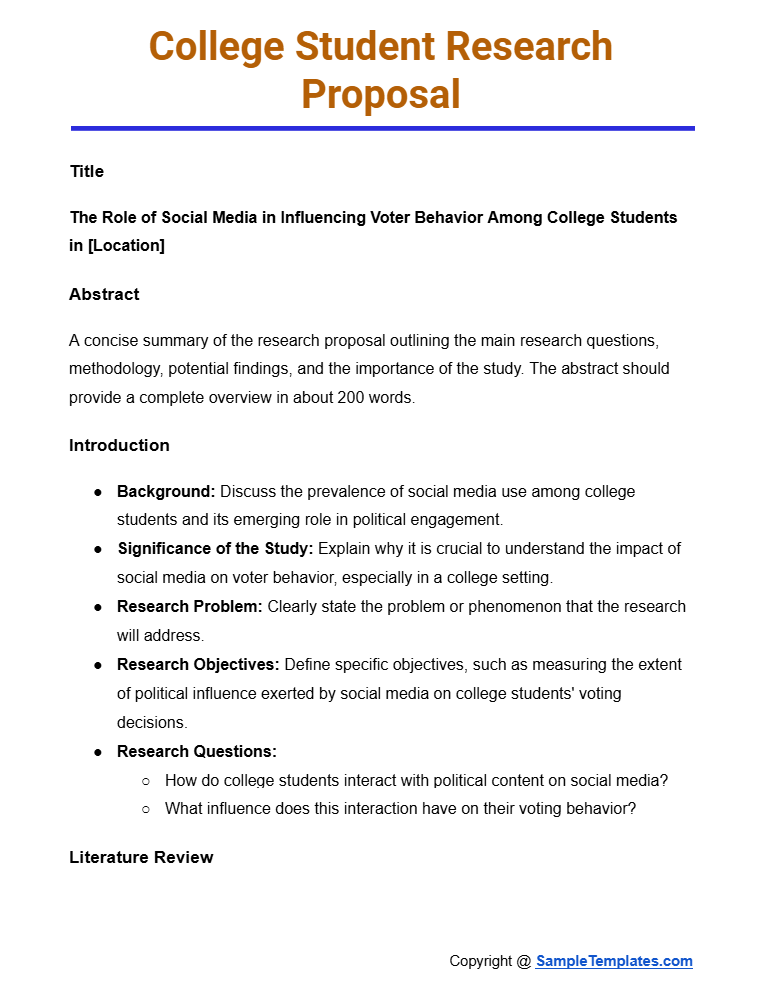
Nursing Student Research Proposal
Title
Impact of Structured Patient Education on Self-Management of Type 2 Diabetes Among Adults
Abstract
A concise overview that includes the background, aims, methodology, expected outcomes, and significance of the research. This should not exceed 300 words and should encapsulate the essence of the proposal.
Introduction
- Background: Discuss the prevalence of Type 2 Diabetes and the importance of effective self-management in improving patient outcomes.
- Significance of the Study: Highlight the potential benefits of patient education programs in managing chronic diseases like diabetes.
- Research Problem: Address the specific challenge or gap in current nursing practices related to diabetes management.
- Research Objectives: For instance, to evaluate the effectiveness of a structured patient education program on the self-management capabilities of diabetic patients.
- Research Questions:
- What are the effects of structured patient education on the self-management behaviors of adults with Type 2 Diabetes?
- How do patients perceive the impact of education on managing their diabetes?
Literature Review
- Theoretical Framework: Introduce theories and models of patient education and behavior change that support the research.
- Review of Related Literature: Analyze previous studies focusing on diabetes education and self-management, noting findings, methodologies, and gaps.
Methodology
- Research Design: Outline the study design (qualitative, quantitative, or mixed-methods), explaining the choice based on the research questions.
- Data Collection Methods: Specify tools and techniques to be used, such as structured interviews, educational interventions, and follow-up surveys.
- Sample: Describe the selection criteria for participants, sample size, and the rationale for these choices.
- Data Analysis: Explain how data will be processed and analyzed, mentioning any software or statistical tools to be employed.
Ethical Considerations
- Ethical Approval: Discuss the process of obtaining ethical approval from relevant committees.
- Participant Consent: Outline how informed consent will be obtained from participants.
- Confidentiality: Describe measures to protect participants’ privacy and data.
Expected Outcomes
- Implications for Practice: Describe how the results could influence nursing practices or education strategies.
- Contribution to Knowledge: Address how this research will add to the existing body of knowledge in nursing and patient education.
Timeline
Provide a detailed timeline for the project, from the initial literature review to data collection, analysis, and final presentation.
Budget
List potential costs associated with the research, including travel for fieldwork, materials for educational sessions, and any compensations for participants.
References
List all references in an appropriate format, ensuring all cited works are included.
Appendices
Attach any additional documents such as questionnaires, educational materials, and consent forms.
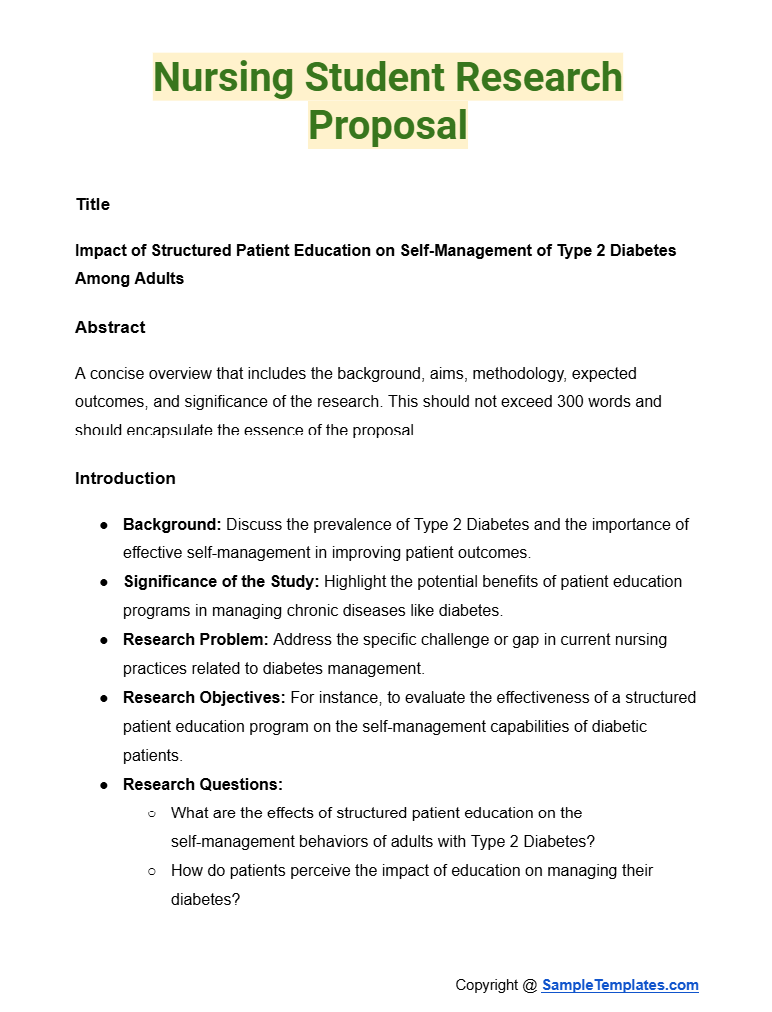
Browse More Templates On Student Research Proposal
1. Student Research Project Proposal Template
2. Sample Student Research Proposal Template
How to Write Student Research Proposal?
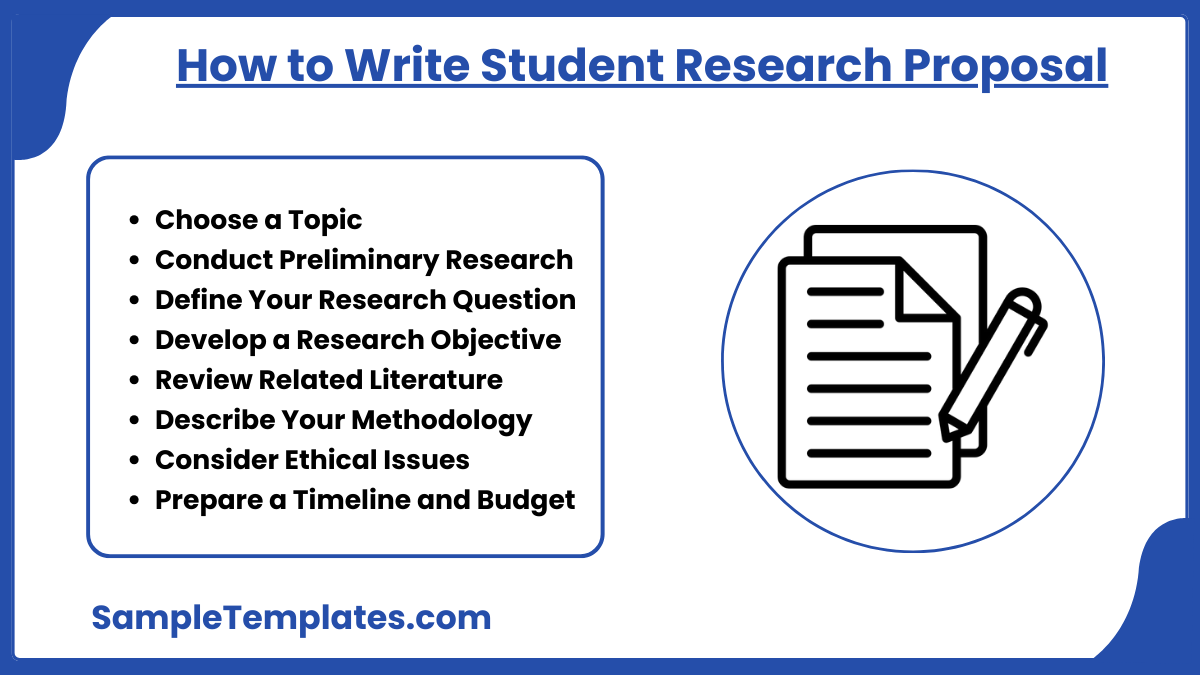
- Choose a Topic: Select a topic that interests you and is relevant to your field of study. It should be specific enough to be manageable but broad enough to allow for comprehensive research.
- Conduct Preliminary Research: Before writing your proposal, do some initial research to understand the current state of knowledge in your topic area. This helps in identifying gaps in the literature and formulating research questions. You can also see more on Research Project Proposal.
- Define Your Research Question: Clearly articulate your research question based on the gaps identified in your preliminary research. This question should guide the focus and purpose of your entire project.
- Develop a Research Objective: Alongside your question, outline specific objectives or goals your research aims to achieve. These should be concise, measurable, and achievable.
- Review Related Literature: Perform an extensive literature review to support your research question and objectives. This will provide a theoretical framework and demonstrate your understanding of the topic’s academic context.
- Describe Your Methodology: Clearly explain the methods you will use to collect and analyze data. This includes detailing your research design, data collection techniques, sampling methods, and plans for data analysis.
- Consider Ethical Issues: Address any ethical considerations relevant to your research, especially if you’re dealing with human subjects. This may involve seeking approval from your institutional review board and detailing how you will obtain informed consent and ensure confidentiality.
- Prepare a Timeline and Budget: Outline a realistic timeline for completing various stages of your research. If applicable, also prepare a budget that accounts for all necessary resources and potential expenses.
3. Student Research Paper Proposal Template
4. Sample Student Research Committee Proposal Template
5. Student Research Project Proposal Template
Tips for Writing a Student Research Proposal
- Start with a Clear Title: Your title should be concise and descriptive, providing a clear indication of your research focus. It sets the tone and gives the first impression of the content of your research.
- Define the Research Problem and Objectives: Clearly articulate the problem your research intends to solve. Make sure your objectives are specific, measurable, achievable, relevant, and time-bound (SMART).
- Conduct a Thorough Literature Review: Before you begin writing, immerse yourself in the literature related to your topic. This will help you understand the current state of research and identify gaps that your study could fill. You can also see more on School Research Proposal.
- Choose the Right Methodology: Select a methodology that best suits your research question. Whether it’s qualitative, quantitative, or mixed methods, your choice should logically support your objectives and be feasible within the constraints of your resources and time.
- Be Persuasive: Use persuasive language to convince the reader of the importance and feasibility of your research. Highlight how your research can contribute to the field and why it is timely or significant.
- Consider Ethical Implications: Address ethical considerations thoroughly, especially if your research involves human subjects. Explain how you will protect their privacy and handle data sensitively.
- Outline a Practical Timeline: Develop a clear and realistic timeline that details when you will complete each phase of your research. This shows planning prowess and feasibility of project completion.
- Proofread and Revise: After writing your proposal, take the time to thoroughly proofread and revise it. Ensure that your ideas are clearly and coherently presented. Feedback from peers or mentors can be invaluable in this process. You can also see more on Scientific Research Proposal.
6. Sample Graduate Student Research Proposal Template
7. Medical Student Research Proposal Template
8. Sample Student Research Fund Call for Proposal Template
9. Student Research Thesis Dissertation Proposal Template
10. Sample Student Research Grant Proposal Template
11. Engineering Student Research Proposal Template
12. Sample Student Research Elective Proposal Template
Purpose of Student Research Proposal
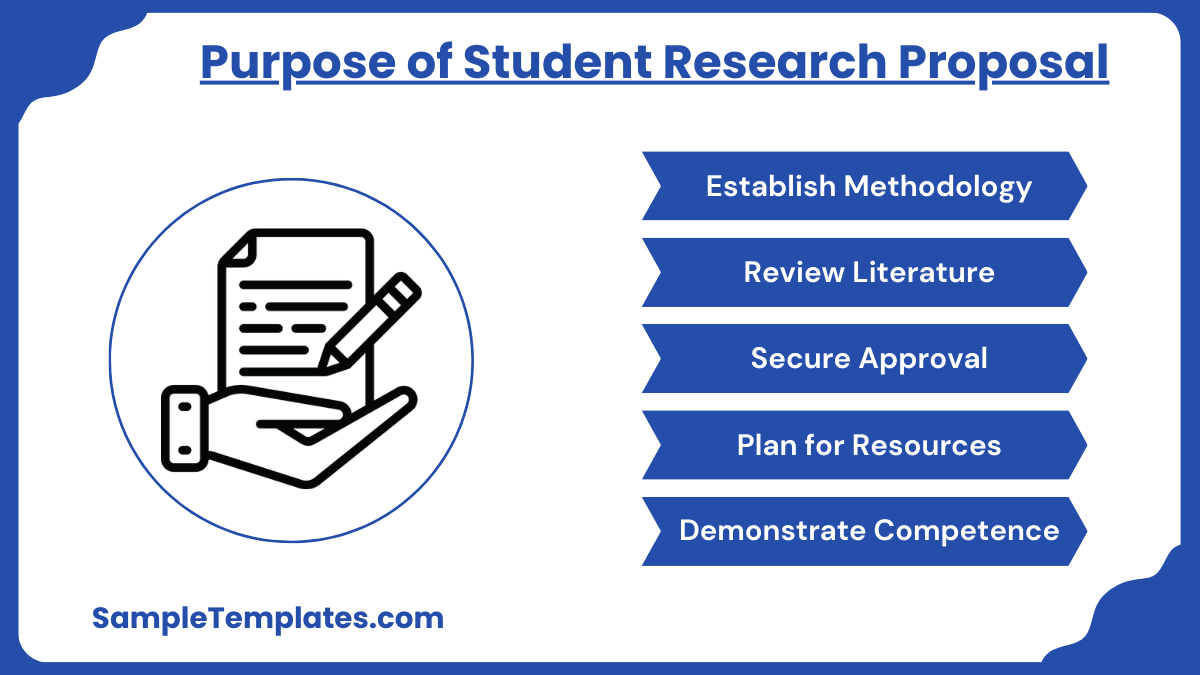
The purpose of a student research proposal includes aspects like proposing a research project that will provide a great contribution into a specific knowledge, formulate a project plan together with its incorporated methodology and theoretical framework, to make sure that the research proposal is achievable with the available resources and within the time period required, and demonstrate that as a researcher, you have sufficient expertise and experience for the work.
- Clarify Research Objectives: It helps the student clearly define and articulate the specific objectives and questions that their research aims to address. You can also see more on Undergraduate Research Proposal.
- Establish Methodology: The proposal outlines the research methods and techniques the student plans to use, detailing how they will collect and analyze data to ensure the study is rigorous and systematic.
- Review Literature: It requires the student to thoroughly review existing literature, helping them understand the current state of research in their field and identify gaps their project could fill.
- Secure Approval: The proposal is often necessary to gain approval from academic supervisors or a thesis committee before the student can proceed with the actual research, ensuring the project is feasible and academically relevant. You can also see more on Postgraduate Research Proposal.
- Plan for Resources: It allows students to plan and justify the resources they need for their research, including funding, time, materials, and access to data or equipment.
- Demonstrate Competence: A well-crafted proposal demonstrates the student’s knowledge and skills in their subject area, proving they are capable of conducting independent research at an advanced level.
Writing a good research proposal will definitely encourage you to give clarifications with regards to your objectives and key ideas. It will even allow you to think about the whole research process so that you can be able to develop a clear sample plan. It will also guide you to see the problems that you would possibly encounter and push you to think of some ways on how you are going to manage each of them when they arise.
What to Include in a Research Proposal?
- Title – you will just place a tentative title for your research. You may change or revise your title if you have already been accepted for admission.
- Abstract – this contains a very concise purpose statement that should only be no more than 100 words. This section must be all about setting out the problem that you would want to examine.
- Research context – you should be able to provide an explanation or a background about the research. It should include a short overview of the general idea in which your research covers that summarizes the current issues or debates.
- Research question – your proposal must have specific questions that will guide your research. Take some time reflecting on the key questions that you are seeking to answer. Reflect on those research questions to ensure that your research or project is feasible enough.
- Research method – the proposal must sample outline some research methods that will explain how you are going to conduct your proposed research.
- Significance of the research – it should be able to demonstrate originality and should explain why your research is essential to the community.
- Bibliography – you must include a list of the sources or a reference list that helped you in identifying the relevant works for your topic.
FAQs
How long should a research proposal be?
A research proposal must be around 2,500 words.
What skills are required for a research proposal?
It requires subject knowledge and research skills, critical thinking skills, and communication skills.
What are some of the common mistakes to avoid?
It includes failure to be concise, failure to cite landmark works in a literature review, failure to delimit contextual boundaries, failure to develop coherent argument, imprecise writing, and too much detail on minor issues.
If you want to see more samples and format, check out some student research proposal samples and templates provided in the article for your reference.
Related Posts
FREE 10+ School Research Proposal Samples
FREE 10+ Organization Proposal Samples
FREE 10+ Marketing Research Proposal Samples
FREE 10+ Drama Proposal Samples
FREE 10+ Research Budget Proposal Samples
FREE 7+ Sample Research Project
How Do You Write a College Research Paper?
FREE 32+ Research Paper Examples
FREE 12+ Sample Research Proposal
FREE 12+ Sample Research Reports
FREE 10+ Science Research Report Samples
FREE 10+ Participatory Action Research Samples
FREE 9+ Group Project Proposal Samples
FREE 9+ Sample Restaurant Proposals
FREE 8+ Sample Professional Proposal
